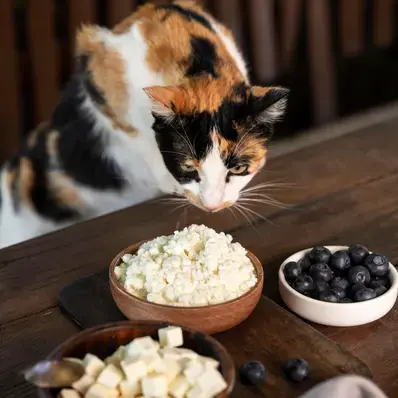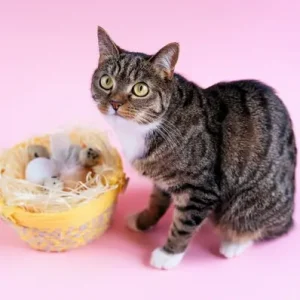Can Cats Eat String Cheese?
Cats can nibble on string cheese occasionally. However, it’s crucial to offer small amounts, as excessive consumption may lead to digestive upset due to lactose content.
Is Cheddar Cheese Bad For Cats?
Cheddar cheese, in moderation, is generally safe for cats. Its lower lactose levels make it a better choice, but always monitor your cat for any adverse reactions.
What About Cream Cheese For Cats?
Cream cheese is higher in lactose and fat, so it’s best to avoid or offer sparingly. Some cats may tolerate small amounts, but too much can lead to stomach issues.
Can Cats Eat Swiss Cheese?
Swiss cheese, being a mild variety, maybe a safer choice for cats. As with any cheese, introduce it gradually and watch for any signs of intolerance.
How About Goat Cheese For Cats?
Goat cheese is often easier on a cat’s stomach due to lower lactose levels. It can be given in moderation as an occasional treat.
Can Cats Eat Mozzarella Cheese?
Yes, cats can eat mozzarella cheese in small amounts. It’s a mild cheese with lower lactose levels, making it a potentially safer option for some cats.
What About Blue Cheese For Cats?
Blue cheese is not recommended for cats. Its strong flavor and higher fat content can be too much for their sensitive digestive systems.
Is Feta Cheese Safe For Cats?
Feta cheese, being a soft cheese with moderate lactose levels, may not be the best choice. Offer sparingly and monitor your cat’s response.
Can Cats Have Gouda Cheese?
Gouda cheese, particularly the mild varieties, can be given to cats in moderation. Monitor for any signs of intolerance or digestive issues.
How About Ricotta Cheese For Cats?
Ricotta cheese is generally safe for cats in small amounts. It has lower lactose levels compared to some other soft cheeses.
Proper Ways to Offer Cheese to Your Cat
If you’ve decided to treat your feline friend to a bit of cheese, it’s essential to do so in a way that ensures their safety and enjoyment.
Follow these guidelines to offer cheese to your cat responsibly:
- Choose Cat-Friendly Varieties: Opt for mild cheeses with lower lactose content, such as mozzarella or cheddar. These are generally better tolerated by cats.
- Introduce Gradually: Start with a tiny amount of cheese and observe your cat’s reaction. If there are no adverse effects, you can gradually offer slightly larger portions.
- Watch For Signs Of Intolerance: Keep an eye out for any signs of digestive upset, such as diarrhea or vomiting. If your cat shows discomfort, stop feeding your cat cheese immediately.
- Avoid Seasoned Or Flavored Cheeses: Steer clear of cheeses with added spices or seasonings, as they may not agree with your cat’s palate or digestive system.
- Cut Into Small Pieces: Chop the cheese into small, manageable pieces to prevent choking and make it easier for your cat to consume.
- Use Cheese As A Treat, Not A Meal: Cheese should be an occasional treat, not a substitute for a balanced cat diet. The high fat and salt content in cheese makes it unsuitable for regular consumption.
- Monitor Overall Diet: Consider your cat’s overall diet when offering cheese. Ensure that the additional calories from treats do not compromise their nutritional balance.
- Consult With Your Veterinarian: If you have concerns about your cat’s ability to tolerate cheese or if they have underlying health issues, consult your veterinarian for personalized advice.
My Cat Ate Cheese: What Should I Do?
If you find yourself in a situation where your curious feline has indulged in a bit of cheese, there’s generally no need to panic. However, it’s crucial to be aware of potential reactions and take appropriate steps:
Firstly, observe your cat for any immediate signs of distress. Cats that are lactose intolerant may experience digestive issues such as upset stomach, diarrhea, or vomiting. If your cat exhibits these symptoms, it’s essential to monitor the severity and duration.
Next, contact your veterinarian to discuss the situation. Provide details about the type and amount of cheese consumed, as well as any observed symptoms. Your vet can offer guidance based on your cat’s individual health and dietary needs.
In some cases, a small amount of cheese might not cause significant problems, especially if your cat doesn’t have lactose intolerance.
However, it’s essential to address any adverse reactions promptly. Your vet may recommend withholding food for a short period to allow your cat’s stomach to settle or suggest other appropriate measures.




